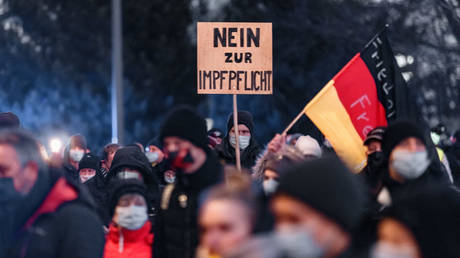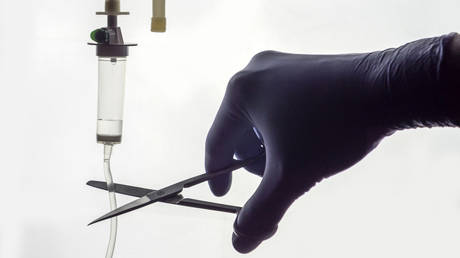
The country’s highest legal authority rejected a petition against a Covid-19 jab requirement for healthcare workers
Germany’s Constitutional Court on Friday rejected a request to postpone a highly-debated mandate requiring healthcare workers to get vaccinated against Covid-19 or provide proof of natural immunity. However, the mandate has already been suspended by one German state.
The court in Karlsruhe ruled against opponents of the mandate, who were seeking a temporary injunction while a legal challenge to the order proceeds through the courts. While the court will rule on the constitutionality of the mandate at a later date, Friday’s ruling clears the way for it to come into effect as planned on March 15.
The mandate will require all employees in hospitals, care homes, doctors’ offices and other healthcare settings like physiotherapy and massage clinics to get fully vaccinated against Covid-19 or provide proof of recovery from the illness. The health authorities will be given the power to either ban those who refuse from the workplace or allow them to work regardless.
Germany has been slower than some of its European neighbors in lifting its coronavirus restrictions. While individual states can set many of their own policies, most have chosen to maintain strict ‘2G’ rules, meaning entry to bars, shops, and restaurants is permitted only to those who can show proof of vaccination or recovery. Some states, like Bremen, Rhineland-Palatinate, and Lower Saxony, require a negative test on top of the standard 2G requirements.
Chancellor Olaf Scholz said on Friday that the federal government will discuss “the first steps at reopening” during a meeting next week.
The wealthy southern state of Bavaria has led the way in rolling back restrictions. While 2G rules remain in place for Bavarian restaurants and bars, they have been scrapped for other businesses and venues, and state premier Markus Soeder announced on Monday that he would not enforce the mandate for healthcare workers. Soeder said the vaccine requirement is “no longer an effective means” to stop transmission of the coronavirus.
The mandate has also been criticized from within the healthcare industry. Daniel Schloer, owner of the SunaCare GmbH agency, warned last month that German households could “have a problem getting the care they need,” as only around 40% of the carers his company works with have been vaccinated.




